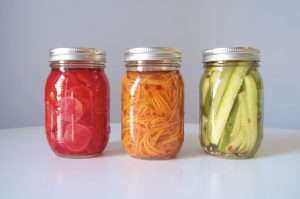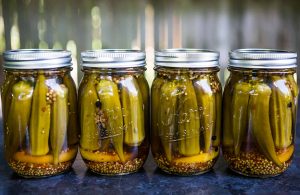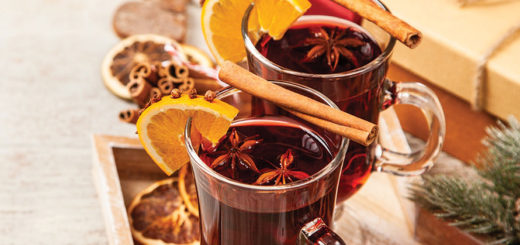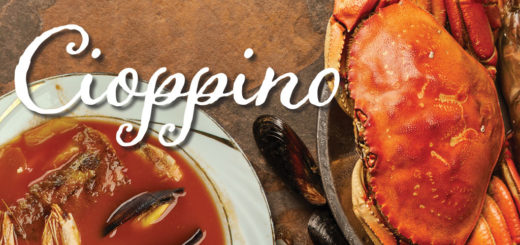What is Pickling?
The Process of pickling began nearly 4,000 years ago to preserve perishable foods for months or even years. Nowadays, the average person in the U.S. consumes 9 lbs. of pickles each year.
Pickling preserves food by anaerobic (Without Oxygen) fermentation in brine or vinegar, or by canning produce in a vinegar-brine, or thirdly by wild fermentation.
Vinegar Brined Pickles vs. Naturally Fermented Pickles
 Using a basic mixture of vinegar, water and salt creates a brine to pickle food and then uses home canning techniques. Foods that are pickled in vinegar brine are not fermented. Pickling using Natural Fermentation for foods with high water content is done by salting the produce to draw the water thereby creating brine. This method is used for making cabbage into sauerkraut. Naturally Fermented pickles contain healthy probiotics and beneficial live bacteria that vinegar-brined pickles won’t have. Natural fermentation requires a pickling crock or a fermentation kit.
Using a basic mixture of vinegar, water and salt creates a brine to pickle food and then uses home canning techniques. Foods that are pickled in vinegar brine are not fermented. Pickling using Natural Fermentation for foods with high water content is done by salting the produce to draw the water thereby creating brine. This method is used for making cabbage into sauerkraut. Naturally Fermented pickles contain healthy probiotics and beneficial live bacteria that vinegar-brined pickles won’t have. Natural fermentation requires a pickling crock or a fermentation kit.
Eating fermented foods can lead to better digestive health, save money on the grocery bill & cut down on waste.
Three Methods For Vinegar-Brine Pickling At Home are quick-pickling, salt-brine pickling, and vinegar-brine soak and rinse method.
Quick Pickles – Pack fresh produce and spices into sterilized canning jars, pour a vinegar-based pickling brine completely submerging the produce, then use the water bath canning method. Asparagus is blanched before pickling. Beets are cooked until tender and cooled before pickling. Cucumbers, carrots, cauliflower, peppers and green beans are all great candidates for quick-pickling. You will have delicious pickles ready to eat in just a few days.
Salt-Brined Method – This is used for pickling vegetables that have a high water content. Before the vegetables are packed into the canning jars, that are soaked it in a salt-vinegar brine solution to draw the water out. This allows the pickling liquid to create a better flavor, texture and shelf life. After you have salt-brined your produce, thoroughly rinse and drain it then use the ‘quick-pickling’ method.
Bread-and-butter pickles, kosher-style dill pickles, cabbage, zucchini, and other high-water content vegetables can be pickled using the salt-brined technique making classic tasting pickles with the flavor, crunch and shelf-life that you expect from your favorite store-bought brands.
 Vinegar-Brine Soak & Rinse Method – This method draws the maximum amount of water out of the produce by soaking, draining and soaking a second time using a vinegar solution. Classic recipes like nine-day, 12-day pickles and Sweet Gherkins are common uses of the vinegar-brined method offering an unmistakable crunch, texture and flavor.
Vinegar-Brine Soak & Rinse Method – This method draws the maximum amount of water out of the produce by soaking, draining and soaking a second time using a vinegar solution. Classic recipes like nine-day, 12-day pickles and Sweet Gherkins are common uses of the vinegar-brined method offering an unmistakable crunch, texture and flavor.
Pickling & Fermentation Supplies
Mountain Feed and Farm Supply (http://www.mountainfeed.com) has put together a handy list of pickling supply and equipment.
1) A Good Book!
The Art of Fermentation by Sandor Elix Katz is the considered the bible of fermentation books and is a must-read for any fermenter. An excellent fermentation recipe book is Real Food Fermentation by Alex Lewin.
2) Mason Jars.
1 pt., 1 qt., and 2 qt. jars with 86 mm “wide mouth” jars. These are the jars common for Mason jar canning and a great way to start fermenting in small batches. Mason jars allow small batches to test out different recipes and when your ferment is complete you can just twist on the lid and pop it in the fridge. Plus, they are clear so you have a good visual on what is going on with your recipe at all times. One of the easiest things to ferment in a mason jar is sauerkraut.
3) Good Kitchen Tools.
A stainless steel bowl, measuring spoons and cups and lots of kitchen towels. These items are essential for clean preparation and sticking to your recipe.
4) Good Pickling Salt.
Choose a salt that is not iodized and free of other minerals. A pure sea salt, Celtic salt or pickling salt is a good choice.
Always make sure you are following all safety guidelines outlined by the USDA (https://nifa.usda.gov/press-release/usdas-complete-guide-home-canning-available) when canning anything.






